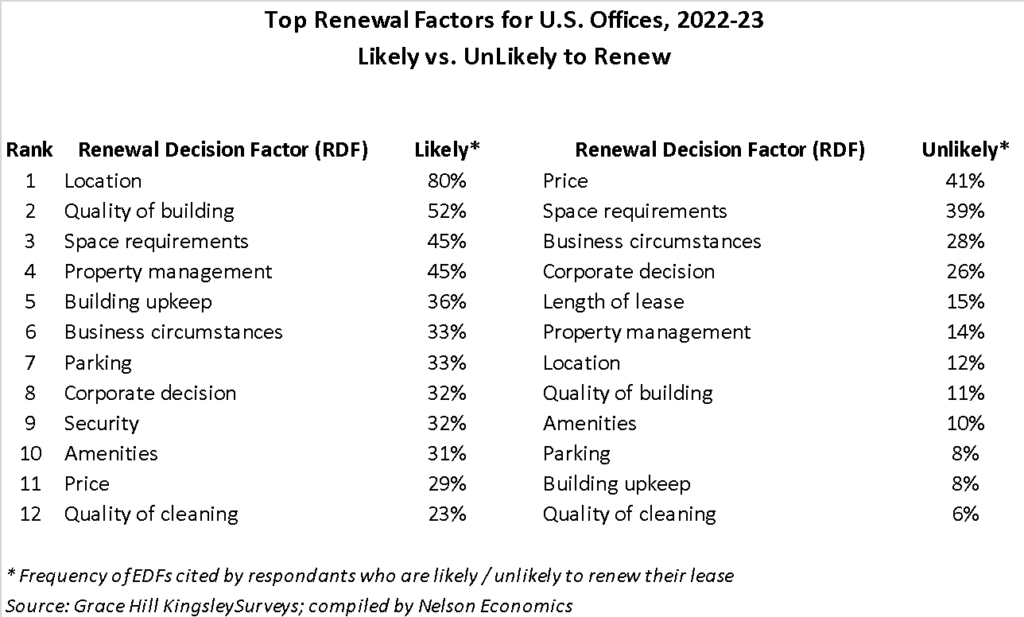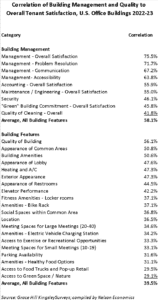What do tenants want? Figuring that out is a top priority for the owners and managers of office buildings, and it’s getting more urgent by the day as firms shed excess space and vacancies keep rising. The business press is increasingly reporting what industry insiders have already known for some time: a combination of cyclical factors and changing work patterns is depressing overall space demand.
Most importantly, we’re all working from home – or a café, or even the beach – much more than before the pandemic. Cost-conscious firms are reducing their commitments. Why lease space that goes unused much of the week? At the same time, many heavy users of office space, especially in the tech sector, are cutting workers that they added in recent years.
What Tenants Want: Quality AND Service
It all translates into reduced office space demand – and much greater competition to attract the smaller pool of tenants looking to lease. Brokers and industry market data tell us that tenants are demanding the newest, highest-quality buildings. Not only is leasing strongest in state-of-the-art facilities, but these Class A buildings also command higher rents and occupancies than Class B buildings. Tenants increasingly seek out buildings with the most advanced designs, the best indoor air quality, and superior safety features. Meanwhile, older buildings are losing tenants in virtually all markets nationwide.
That’s good news for owners of top-quality new construction. These buildings are capturing a disproportionate share of leasing activity. But what about the other 95% of buildings that are not so new? How can they compete?
One strategy, of course, is to undertake capital improvements to upgrade the building systems. But those physical improvements take time and require substantial resources – with uncertain returns. Can managers do anything short-term to make their buildings more appealing?
Fortunately, there are options available to managers that are not only effective but also relatively affordable. We know from recent research that office tenants satisfied with their buildings are more likely to renew, and the perceived quality of property management plays an outsized role in tenant satisfaction levels. A major new academic study published by economists at Maastricht University and MIT entitled “Tenant Satisfaction and Commercial Building Performance” found a strong correlation between the degree of tenant satisfaction and their stated likelihood of renewing their lease; willingness to recommend the property to a third party; and, most importantly, whether the tenant ultimately stayed or exited the building. Thus, property managers can increase the odds of lease renewal by enhancing tenant satisfaction through attentive property management.
Raising Tenant Satisfaction
But what can managers do to increase tenant satisfaction? Tenant responses to Grace Hill’s KingsleySurveys provide some answers.
The questionnaires ask tenants about their likelihood of renewing their lease and the considerations that most influence their decision. Grace Hill calls these “renewal decision factors.” Physical building attributes such as location and building quality are top factors, particularly for tenants that anticipate renewing. But as shown in the following chart, “property management” and “building upkeep” matter almost as much as “quality of building.” These are factors that property managers can control and improve as a normal matter of course in building oversight.

On the other hand, when tenants intend NOT to renew, they are much more likely to cite financial factors, like price, or unique corporate issues, such as space requirements and business circumstances. It may be unrealistic to expect even outstanding property management to overcome these economic or corporate considerations when the space options in the building no longer work for the tenant. Nonetheless, the tenant survey responses suggest landlords can raise renewal odds through superior property management under normal circumstances.
Since happier tenants are more likely to renew and recommend the building to others, building owners can also improve renewal probabilities by focusing management efforts on the specific factors that lead to greater tenant satisfaction.
Which factors matter? Again, we can turn to KingsleySurveys for some valuable insights into which building attributes most highly correlate with overall tenant satisfaction. As shown in the following table summarizing survey responses from U.S. office tenants, both building management and physical building features are highly correlated with overall tenant satisfaction. On average, however, the factors under direct management control matter most to tenants, with an average correlation to tenant satisfaction of 58% versus under 40% for physical attributes.

In the wake of the pandemic, there is no doubt that tenants strongly prefer the newest buildings where they can feel safe and work most efficiently. Market data clearly shows that newly built offices are outperforming older buildings. Nonetheless, many issues matter to tenants that are under the direct control of property managers. In this competitive environment, managers must up their game and improve service delivery in order to attract tenants and improve their operating fundamentals.
Do you need unbiased data on your tenant satisfaction and likeliness to renew? Talk to the KingsleySurveys CRE experts to learn how we can help.



